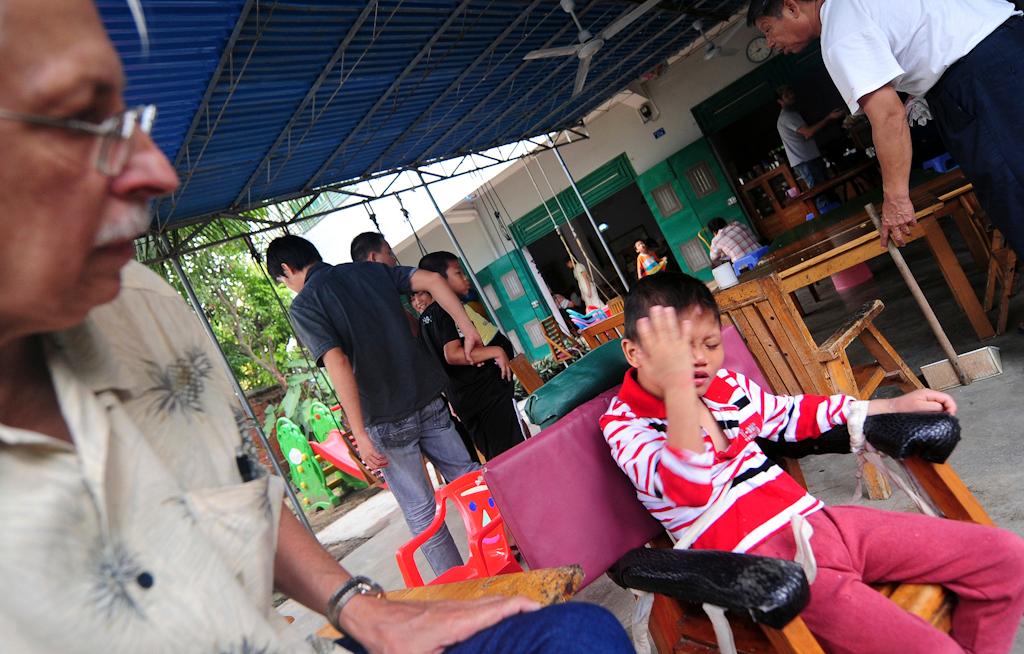South Korean study reveals high autism rates
Suxie, 6, who suffers from autism hits himself immediately after being untied to a chair as John Davies (L) looks on at the Bright Connection centre in Sanya, on October 26, 2009 in China’s southernmost island province of Hainan. The centre was set up in 2004 by US couple John and Maggie Davies from Colorado who moved to the sub-tropical island in the mid-1990’s as consultants for its booming hotel industry but were moved by what they saw as the huge needs of local disabled children, eventually adopting in 1997 an abandoned local baby girl, severely disabled by cerebral palsy and autism, and now care for and provide therapy for up to 25 children with cerebral palsy, autism, or both.
Autism may be much more common than previously thought, according to new research from South Korea that suggests autism is a global problem and may be significantly underdiagnosed.
Researchers found that one of every 38 children in a community in South Korea had autism, a rate of 2.64 percent — far higher than the estimated 1 percent rate in the United States and Europe, according to the study by South Korean, U.S. and Canadian scientists. Autism includes a broad spectrum of disorders, from a severe inability to communicate to relatively mild symptoms such as with Asperger’s syndrome.
The five-year study, published in the American Journal of Psychiatry, involved screening 55,000 children aged 7 to 12 from the Ilsan district of Goyang city in South Korea, from regular schools as well as special needs classrooms and mental health services programs.
The study found that rates of autism spectrum disorders (ASD) among children in the special education classes and mental health services programs were on par with estimates elsewhere in the world, from 0.6 percent to 1.8 percent of the population. But the prevalence rate rose to 2.64 percent when students in regular schools were included.
Many parents in Asia are ignorant about autism symptoms and do not want to acknowledge that their children may have autism, Reuters reports. Students with autism who attend regular schools tend to be high functioning, with milder forms of autism such as Asperger’s syndrome. However, while the students might keep up academically, they may struggle with the social aspects of school.
The researchers said that they would expect similarly high rates of autism in the U.S. and elsewhere if the same methods of data collection were used. The U.S. rate of autism spectrum disorders is around 1 percent, or 1 in 110, according to the U.S. Centers for Disease Control and Prevention.
"It raises a question, I think, of whether we are underestimating the prevalence in the U.S. as well as elsewhere,” Geraldine Dawson, chief scientific officer of the research and advocacy group Autism Speaks and an autism researcher at the University of North Carolina at Chapel Hill, told the Los Angeles Times.
"Recent research reveals that part of the increase in reported ASD prevalence appears attributable to factors such as increased public awareness and broadening of diagnostic criteria. This study suggests that better case finding may actually account for an even larger increase,” said Dr. Young-Shin Kim of Yale University.
The study was funded by Autism Speaks, the National Institute of Mental Health and several foundations.
Every day, reporters and producers at The World are hard at work bringing you human-centered news from across the globe. But we can’t do it without you. We need your support to ensure we can continue this work for another year.
Make a gift today, and you’ll help us unlock a matching gift of $67,000!
